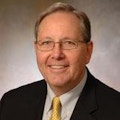Peter B. Littlewood, Ph.D.
Professor of Physics, University of ChicagoScientific Advisory Board, Flatiron Institute

Before joining the faculty at the University of Chicago, Peter Littlewood was director of Argonne National Laboratory and before that a professor of physics at the University of Cambridge and head of the Cavendish Laboratory. He is the founding executive chair of the Faraday Institution, the U.K.’s independent center for electrochemical energy storage science and technology, supporting research, training and analysis.
Littlewood went to Chicago and to Argonne in 2011 after being appointed associate laboratory director of the laboratory’s physical sciences and engineering directorate, and served from 2014 to 2016 as laboratory director. Argonne is a multidisciplinary science and engineering research center born out of the Manhattan Project, working to answer the biggest questions facing humanity, from how to obtain affordable clean energy to protecting ourselves and our environment. Littlewood spent the previous 14 years at the University of Cambridge, where he last served as the head of the Cavendish Laboratory and the Department of Physics. He began his career with almost 20 years at Bell Laboratories, ultimately serving for five years as head of theoretical physics research.
Littlewood holds six patents, has published more than 250 articles in scientific journals and has given more than 300 invited talks at international conferences, universities and laboratories. His research interests include superconductivity and superfluidity, strongly correlated electronic materials, collective dynamics of glasses, density waves in solids, neuroscience, and applications of materials for energy and sustainability. He is a fellow of the Royal Society of London, the Institute of Physics, the American Physical Society and TWAS (The World Academy of Sciences). He serves on advisory boards of research and education institutions and other scientific organizations worldwide. He holds a bachelor’s degree in natural sciences (physics) and a doctorate in physics, both from the University of Cambridge.